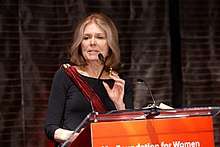Gloria Marie Steinem (born March 25, 1934) is an American feminist, journalist, and social and political activist who became nationally recognized as a leader of, and media spokeswoman for, the women's liberation movement in the late 1960s and 1970s. A prominent writer and key counterculture era political figure, Steinem has founded many organizations and projects and has been the recipient of many awards and honors. She was a columnist for New York magazine and co-founded Ms. magazine.
Quotes
- This is no simple reform. It really is a revolution. Sex and race, because they are easy, visible differences, have been the primary ways of organizing human beings into superior and inferior groups, and into the cheap labor on which this system still depends. We are talking about a society in which there will be no roles other than those chosen, or those earned. We are really talking about humanism.
- "Address to the Women of America" (10 July 1971)
- Any woman who chooses to behave like a full human being should be warned that the armies of the status quo will treat her as something of a dirty joke. That's their natural and first weapon. She will need her sisterhood.
- "Sisterhood" in New York Magazine (20 December 1971), p. 49
- I have met brave women who are exploring the outer edge of human possibility, with no history to guide them, and the courage to make themselves vulnerable that I find moving beyond words.
- "Sisterhood" in New York Magazine (20 December 1971), p. 49
- However sugarcoated and ambiguous, every form of authoritarianism must start with a belief in some group's greater right to power, whether that right is justified by sex, race, class, religion or all four. However far it may expand, the progression inevitably rests on unequal power and airtight roles within the family.
- "If Hitler Were Alive, Whose Side Would He Be On?" in M.S. magazine (October-November 1980); later in Outrageous Acts and Everyday Rebellions (1983)
- If the shoe doesn't fit, must we change the foot?
- Outrageous Acts and Everyday Rebellions (1983), p. 228
- As the little boy said when asked if he wanted to be a lawyer like his mother, "Oh no, that's women's work." Logic has nothing to do with oppression.
- Outrageous Acts and Everyday Rebellions (1983), p. 367
- Women may be the one group that grows more radical with age.
- Outrageous Acts and Everyday Rebellions (1983), p. 377
- Law and justice are not always the same. When they aren't, destroying the law may be the first step toward changing it.
- As quoted in Building a Life of Value : Timeless Wisdom to Inspire and Empower Us (2005) by Jason A. Merchey, p. 225
Revolution From Within
- I’ve learned from these events that self-esteem plays as much a part in the destiny of nations as it does in the lives of individuals; that self-hatred leads to the need either to dominate or to be dominated; that citizens who refuse to obey anything but their own conscience can transform their countries; in short, that self-esteem is the basis of any real democracy.
- I think we each come out of the womb with some unique way of looking at the world and if we don't express it, we loose faith in ourselves.
- Like the spider spinning its web, we create much of the outer world from within ourselves. The universe is a joint product of the observer and the observed.
- Citizens who refuse to obey anything but their own conscience can transform countries, it is the basis of any real democracy.
- Artists strive to free this true and spontaneous self in their work. Creativity, meditation are ways of freeing an inner voice
Moving Beyond Words (1994)

Like art, revolutions come from combining what exists into what has never existed before.
- Moving Beyond Words: Age, Rage, Sex, Power, Money, Muscles: Breaking Boundaries of Gender (1994)
- Like art, revolutions come from combining what exists into what has never existed before.
- Part 4 : The Masculinization of Wealth, p. 196
- God may be in the details, but the goddess is in the questions. Once we begin to ask them, there's no turning back.
- Part 6 : Doing Sixty, p. 270
- I'm not sure feminism should require an adjective. Believing in the full social, political, and economic quality of women, which is what the dictionary says "feminism" means, is enough to make a revolution in itself. But if I had to choose only one adjective, I still would opt for radical feminist. I know patriarchs keep equating that word with violent or man-hating, crazy or extremist — though being a plain vanilla feminist doesn't keep one safe from such epithets either, nor does "I'm not a feminist, but ..." Nonetheless, radical seems an honest indication of the fundamental change we have in mind and says what probably is the case: the false division of human nature into “feminine” and “masculine” is the root of all other divisions into subject and object, active and passive — the beginning of hierarchy.
- Part 6 : Doing Sixty, p. 270
- Basically, I feel different from most other women. I feel I don’t have to put on an act. If I’m not feminine enough for someone, I don’t care, because femininity is different in everyone’s mind.
- Gender is the remaining caste system that still cuts deep enough, and spreads wide enough, to be confused with the laws of nature. To uncover the difference between what is and what could be, we may need the “Aha!” that comes from exchanging subject for object, the flash of recognition that starts with a smile, the moment of changed viewpoint that turns the world upside down.
The Humanist interview (2012)

I always thought that "humanist" was a good word long before I understood that anyone thought it was a bad word.
- Interview, after being chosen "2012 Humanist of the Year" (7 June 2012), as published in "The Humanist Interview with Gloria Steinem" in The Humanist (September / October 2012)
The Arab Spring did a great deal for women because the person who spread the word in the first place was a woman. Women participated in it; they were fully out there in the street.
Nawal El Saadawi is a founding figure of Egyptian and Middle Eastern feminism who wrote a book opposing female genital mutilation (of which she is a victim). She’s been banned. She’s been in prison.

Humanist is a great term. …except that humanism sometimes is not seen as inclusive of spirituality … the belief that all living things share some value.

I like to say that the last five-to-ten thousand years has been an experiment that failed and it’s now time to declare the first meeting of the post-patriarchal, post-racist, post-nationalist age.
- I always thought that "humanist" was a good word long before I understood that anyone thought it was a bad word. It seems to me that it means you believe in the great potential and the best of human beings, so I didn’t have to overcome anything to accept this award; it seemed an unmitigated honor. And since the ultra-right wing has tried so hard to make it a bad word— “humanist” has been demonized in much the same way that the word “feminist” has — it seemed especially important to identify as humanist and support humanist groups.
- It doesn’t surprise me to learn that there is bias and sexism everywhere, just like there are problems of racism and homophobia stemming from the whole notion that we’re arranged in a hierarchy, that we’re ranked rather than linked. I think we’ve learned that we have to contend with these divisions everywhere.
- The men I’ve met who were the best allies of feminism are those who see their stake in it; who see that they themselves are being limited by a culture that deprives men of human qualities deemed feminine, which are actually just the qualities necessary to raise kids — empathy and attention to detail and patience. Men have those qualities too but they’re not encouraged to develop them. And so they miss out on raising their kids, and they actually shorten their own lives. When men realize that feminism is a universal good that affects them in very intimate ways then I think they really become allies and leaders.
- Regarding the idea that the women’s movement is white and middle class — a fair share of the country is white and middle class. And certainly, there are racist white women. Certainly, there are sexist black men. All those things are true. But the other thing that’s never said is that black women are much more likely to support feminist issues than white women. It makes sense because they’re much more likely to be on the paid labor force than white women. And if you’ve experienced discrimination for one reason, you’re probably more likely to recognize it for another reason.
- If you think about Martin Luther King and others in the leadership of the Civil Rights movement, they were all college-educated, middle class people. Nobody tries to diminish the Civil Rights movement by saying they were middle class.
It’s true that the National Organization for Women in its early years was white middle class. But once it was joined by younger women from civil rights groups like SNCC (Student Nonviolent Coordinating Committee) it changed profoundly. In any case, my life’s ambition is to make white women as smart as black women. Because the group of women who still vote against their own self-interest are white married women.
- I was perversely delighted to see the Catholic Church and the Vatican go after nuns because I think they made a major error. People are quite clear in viewing nuns as the servants and the teachers and the supporters of the poor. You contrast that with the fact that the Vatican did virtually nothing about long-known pedophiles, and it’s just too much.
Their stance on abortion is also quite dishonest historically, because as the Jesuits (who always seem to be more honest historians of the Catholic Church) point out, the Church approved of and even regulated abortion well into the mid-1800s. The whole question of ensoulment was determined by the date of baptism. But after the Napoleonic Wars there weren’t enough soldiers anymore and the French were quite sophisticated about contraception. So Napoleon III prevailed on Pope Pius IX to declare abortion a mortal sin, in return for which Pope Pius IX got all the teaching positions in the French schools and support for the doctrine of papal infallibility. … My favorite line belongs to an old Irish woman taxi driver in Boston. Flo Kennedy and I were in the backseat talking about Flo’s book, Abortion Rap (1971), and the driver turned around and said, “Honey, if men could get pregnant, abortion would be a sacrament.” I wish I’d gotten her name so we could attribute it to her.
- This war against women started a long time ago with old Democrats who took over the Republican Party, which was, before that, the very first to support the Equal Rights Amendment. Even when the National Women’s Political Caucus started, there was a whole Republican feminist entity. But beginning with the Civil Rights Act of 1964, right-wing Democrats like Jesse Helms began to leave the Democratic Party and gradually take over the GOP.
So I always feel I have to apologize to my friends who are Republicans because they’ve basically lost their party. Ronald Reagan couldn’t get nominated today because he was supportive of immigrant rights. Barry Goldwater was pro-choice. George H.W. Bush supported Planned Parenthood. No previous Republicans except for George W. Bush would be acceptable to the people who now run the GOP. They are not Republicans. They are the American version of the Taliban. … They’ve taken over one of our two great parties. This causes people to wrongly think that the country is equally divided but if we look at the public opinion polls, it isn’t. So, I can’t think of anything more crucial than real Republicans taking back the GOP.
- I think feminists and progressive Democrats err when they accusingly say to Republican women, “How can you be a Republican?” Nobody responds to that. But if you say, “Look, you didn’t leave your party. The party left you. Let’s just look at the issues and see what they are and forget about party labels and vote for ourselves,” I think people would really respond.
- If someone wants to be called a sex worker, I call them a sex worker. But there is a problem with that term, because while it was adopted in goodwill, traffickers have taken it and essentially said, “Okay, if it’s work like any other, somebody has to do it.” In Nevada, there was a time when you couldn’t get unemployment unless you tried sex work first. The same was true in Germany. So the state became a procurer because of the argument that sex is work like any other. This is not a good thing.
I also do not feel proud when I stand in the Sonagachi, the biggest brothel area in all of South Asia. It’s in Kolkata, and everything is written in Bengali except “SEX WORK.” And the term is used in various sinister ways by sex traffickers, who even describe what they do — which is to kidnap or buy people out of villages — as “facilitated migration.”
I’ve only ever met one woman who actually was a prostitute of her own free will. She didn’t have a pimp. She could pick and choose her customers. That’s so rare. So we have to look at the reality and not romanticize it. We have to be clear that you have the right to sell your own body but nobody has the right to sell anybody else’s body. No one has that right.
- The Arab Spring did a great deal for women because the person who spread the word in the first place was a woman. Women participated in it; they were fully out there in the street. Nawal El Saadawi is a founding figure of Egyptian and Middle Eastern feminism who wrote a book opposing female genital mutilation (of which she is a victim). She’s been banned. She’s been in prison. She’s now in her eighties and during the Arab Spring she was like the wise woman of Liberation Square, sitting in the middle of it as young women and young men came to her for instruction, for blessings, and so on.
But it’s very often the case with revolutionary moments that women are present but then they’re drummed out of it afterwards.
- I think most social justice movements take the words that are used against them and make them good words. That’s partly how “black” came back into usage. Before we said “colored person,” or “Negro.” Then came “Black Power,” “Black Pride,” and “Black Is Beautiful” to make it a good word.
"Witch" was another word I remember reclaiming in the 1970s. There was a group called Women’s International Terrorist Conspiracy from Hell (WITCH). They all went down to Wall Street and hexed it. And Wall Street fell five points the next day; it was quite amazing! “Queer” and “gay” are other examples. … I think we all have the power to name ourselves. I try to call people what it is they wish to be called. But we can take the sting out of epithets and bad words by using them. Actually, I had done that earlier with “slut” because when I went back to Toledo, Ohio, which is where I was in high school and junior high school, I was on a radio show with a bunch of women. A man called up and called me “a slut from East Toledo,” which is doubly insulting because East Toledo is the wrong side of town. I thought, when I’d lived here I would have been devastated by this. But by this time I thought, you know, that’s a pretty good thing to be. I’m putting it on my tombstone: "Here lies the slut from East Toledo."
- There were never that many women stand-up comics in the past because the power to make people laugh is also a power that gets people upset. But the ones who were performing were making jokes on themselves usually and now that’s changed. So there are no rules exactly but I think if you see a whole group of people only being self-deprecating, it’s a problem.
But I have always employed humor, and I think it’s absolutely crucial that we do because, among other things, humor is the only free emotion. I mean, you can compel fear, as we know. You can compel love, actually, if somebody is isolated and dependent — it’s like the Stockholm syndrome. But you can’t compel laughter. It happens when two things come together and make a third unexpectedly. It happens when you learn something, too. I think it was Einstein who said he had to be careful when he shaved because if he thought of something suddenly, he’d laugh and cut himself.
So I think laughter is crucial. Some of the original cultures, like the Dalit and the Native American, don’t separate laughter and seriousness. There’s none of this kind of false Episcopalian solemnity.
- If it were up to me, I would not define myself by the absence of something; "theist" is a believer, so with "atheist" you’re defining yourself by the absence of something. I think human beings work on yes, not on no. … humanist is a great term. …except that humanism sometimes is not seen as inclusive of spirituality. To me, spirituality is the opposite of religion. It’s the belief that all living things share some value. So I would include the word spiritual just because it feels more inclusive to me. Native Americans do this when they offer thanks to Mother Earth and praise the interconnectedness of “the two-legged and the four, the feathered and the clawed,” and so on. It’s lovely. … because it’s not about not believing. It’s about rejecting a god who looks like the ruling class.
- I like to say that the last five-to-ten thousand years has been an experiment that failed and it’s now time to declare the first meeting of the post-patriarchal, post-racist, post-nationalist age. So let’s add “post-theological.” Why not?
My Life on The Road
- You're always the* person you were when you were born," she says impatiently. "You just keep finding new ways to express it.
- You should write about take no-shit women like me. Girls need to know they can break the rules
- I myself cried when I got angry, then became unable to explain why I was angry in the first place. Later I would discover this was endemic among female human beings. Anger is supposed to be "unfeminine" so we suppress it -until it overflows. I could see that not speaking up made my mother feel worse. This was my first hint of the truism that depression is anger turned inward; thus women are twice as likely to be depressed. My mother paid a high price for caring so much, yet being able to do so little about it. In this way, she led me toward am activist place where she herself could never go.
Misattributed
- A woman needs a man like a fish needs a bicycle.
- This quote was popularized by Steinem and is often attributed to her. However, the line was first coined by Australian educator Irina Dunn, as indicated at The Phrase Finder
- Housewives are dependent creatures who are still children... parasites.
- Actual quote: "If role reform sounds sexually unsettling, think how it will change the sexual hypocrisy we have now. [...] No more men who are encouraged to spend a lifetime living with inferiors; with housekeepers, or dependent creatures who are still children."
- "What It Would Be Like If Women Win", Time (31 August 1970)
- Actual quote: "If role reform sounds sexually unsettling, think how it will change the sexual hypocrisy we have now. [...] No more men who are encouraged to spend a lifetime living with inferiors; with housekeepers, or dependent creatures who are still children."
Quotes about Steinem
- If we adopt Gloria Steinem's definition of a feminist — "Anyone who recognizes the equality and full humanity of women and men" — most of us are probably feminists, too. This was a radical innovation two thousand years ago, when the first Christians proclaimed the equal value of all people.
- Frederica Mathewes-Green and Haven Bradford Grow, "Feminists Should Oppose Abortion, in Feminism: Opposing Viewpoints" (September 1994), edited by Carol Wekesser, p. 218
- She is so deluded that she genuinely believes she speaks for all women. She's a victim of her own success. I liked the early Steinem. There was once a survey conducted for Time about who would make a good candidate for the first female president, and I wrote in Gloria Steinem. But now? Gloria Steinem is dissing men and dissing fashion and she's out having her hair streaked at Kenneth's. She became a socialite with a coterie. A lot of middle-aged white ladies still love her, but the media have been negligent regarding her.
- The horrible truth is that the feminist establishment in the U.S., led by Gloria Steinem, did in fact apply a double standard to Bill Clinton’s behavior because he was a Democrat. The Democratic president and administration supported abortion rights, and therefore it didn’t matter what his personal behavior was. [...] The actual facts of the matter are that Bill Clinton was a serial abuser of working-class women–he had exploited that power differential even in Arkansas.
- Camille Paglia, as quoted by David Daley, "Camille Paglia: How Bill Clinton is like Bill Cosby", Salon.com, 28 July 2015
External links
This article is issued from
Wikiquote.
The text is licensed under Creative
Commons - Attribution - Sharealike.
Additional terms may apply for the media files.


